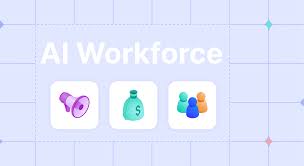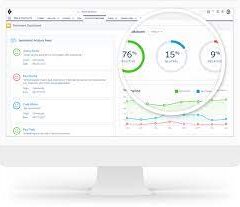AI Agents in Line at HR may only be a satirical cartoon for a very short time. Sorry, Farside, but your AI bits may not be able to keep up with AI.
July, 2034 — A new software unicorn has just emerged inbehind a bar in a pub in East London. Unicorn, by the way, descibes a startup company valued at over $1 billion, not necessarily with a billion dollar concept. Back to East London behind the soggy bar. Hey, its our fantasy. Besides if Amazon can start in a garage, isn’t anything possible?
The CEO logs in as usual and gathers daily updates from the team. The Chief Technology Officer is suggesting a new feature to deploy. The Chief Product Officer wants to redesign the CRM (or whatever CRM has evolved to) integration. The Chief Revenue Officer is showing off the new pipeline, forecast by Accountant in a Box. The Chief Customer Officer is discussing the latest customer levitation tools and product feedback. The Chief Information Security Officer has found a new privacy conflict, which they are addressing with a newly-revised infrastructure set-up. And the Head of HR is fretting about the latest round of IT candidates.
This sounds like every software business you’ve ever heard of. But the difference is that the CEO’s teammates are entirely AI, not human:
The CTO is Lovable. The CPO is Cogna. The CCO is Gradient Labs. The CRO is 11x. The CISO is Zylon.
Back to 2024: The Rise of AI Agents
In 2024, the hottest topic in software is AI agents, or Agentic AI. Founders are rapidly standing up agentic applications that can solve specific needs in functions like sales and customer services — without a human required. Software buyers, seeing real opportunities to quickly improve their P&L, are swiftly building or purchasing these agentic products. Investors have poured hundreds of millions of dollars into startups in this space in recent months.
Even Salesforce wasn’t launched with a silver AI spoon in its mouth.
Salesforce began investing in artificial intelligence (AI) in 2014, when the company started acquiring machine learning startups and announced its Customer Success Platform. In 2016, Salesforce launched Einstein, its AI platform that supports several of its cloud services. Einstein is built into Salesforce products and includes features like natural language processing, machine learning, and predictive analytics. It helps organizations automate processes, make decisions based on insights, and improve the customer experience.

YouTube
How To Increase Revenue Using AI for CRM: Salesforce …
Feb 12, 2024 — What is Salesforce Einstein? Salesforce Einstein is the first trusted artifici…

TechForce Services
How does Salesforce Use AI for Business Growth?
Jan 31, 2024 — Powered by technologies like Machine Learning, Natural Language Processing, im…


saasguru ·
LinkedIn · 7mo
History of Salesforce AI From Predictive to Generative – LinkedIn
Published Nov 27, 2023. In 2014, Salesforce, under the visionary leadership of…

Twistellar
AI in Salesforce: History, Present State and Prospects
Organizations generate tons of data on marketing and sales, and surely your sales managers…

Wikipedia
Salesforce – Wikipedia
In October 2014, Salesforce announced the development of its Customer Success Platform. Less than ten years ago, folks.
Salesforce’s large database of data has helped the company address AI challenges quickly and with quality. The company’s data cloud offering provides AI with the right information at the right time, which can reduce friction and improve the customer experience.
Salesforce’s AI-powered solutions include:
- Einstein – Salesforce’s flagship AI tool that can automate processes and help organizations make decisions based on insights
- Tableau Pulse – An AI feature set in Tableau, Salesforce’s data analytics platform, that helps users analyze data about sales, marketing, product, and relationship management performance
To catalyze this evolution, Salesforce strategically acquired RelateIQ in 2014. This move injected machine learning into the Salesforce ecosystem, capturing workplace communications data and providing valuable insights.
Europe is home to many of these exciting companies. For example, H, a French AI agent startup, raised a $220 million seed round in May.
Beyond RPA: The New Wave of AI Agents
AI agents represent a significant step-change from Robotic Process Automation (RPA) bots, which, as explored last year, have several limitations due to their deterministic nature. Next-generation AI agents are non-deterministic, meaning that instead of stopping at a “dead end,” they can learn from mistakes and adjust their series of tasks. Not entirely unlock the mouse running the same maze over and over for the cheese. Eventually Mr. Squeakers learns which paths are dead ends and avoids them by making better choices at intersections. In AI Agents this makes them suited to complex and unstructured tasks and means they can transform the journey from intent to implementation in software development. They can deliver “pure work,” rather than acting only as a helpful co-pilot.
The rise of AI agents is not only an opportunity to expand automation beyond what is possible with RPA but also to broadly redefine how knowledge work is performed. And by who. And even how is it defined. Given the right guardrails, next-generation AI agents have the potential to effectively and safely replace knowledge workers in many business scenarios.
AI Agents in Action
These agents are about to revolutionize the world of work as we know it and are already getting started. For example, Klarna recently revealed that its AI agent system handled two-thirds of customer chats in its first month in operation. While HR may not be swamped with AI CVs yet, it is certainly fathomable. One would suppose those candidates would have to be reviewed and interviewed by IT, not just HR.
Here’s another deep thought. The internet of things (IoT) first appeared in a speech by Peter T. Lewis in September 1985. The Internet of Things (IoT) is a network of physical devices that can collect and transmit data over the internet using sensors, software, and other technologies. IoT devices can communicate with each other and with the cloud, and can even perform data analysis and be controlled remotely.
The IoT concept was smart homes, health care environments, office spaces, and transportation. Only recently have we begun to think of the IoT as including the actual computers, or AI, in addition to sensored devices. It isn’t exactly a chicken and the egg question, but more of a what bucket to put the chicken and the egg in thing.
To understand the massive impact that AI agents will have on the world, leaders at some of the most exciting companies in this space were interviewed: Ben Peters at Cogna, Anton Osika at Lovable, Dimitri Masin at Gradient Labs AI, Hasan Sukkar from 11x, and Iván Martínez Toro at Zylon. We asked these sector experts to explain the impact of AI agents on software development and to outline to what extent they will replace knowledge workers in the future.
AI Agents: Building Products
Ben (Cogna) and Anton (Lovable) are founders of agentic startups at the forefront of fundamentally changing how software applications are built.
Until now, the process of building software has been resource-heavy, expensive, and time-consuming. Non-technical teams and companies have relied on excess internal engineering capacity (which is rare) to deliver their software projects, or on expensive and slow IT consultancies. This setup has meant that app development has been inaccessible to vast parts of the economy.
With the rise of AI agents — including Cogna and Lovable — this is changing. Non-tech companies can now use these agents to build applications faster and at lower cost, reducing the knowledge bar to software building, enabling rapid iteration cycles, and generally extending far beyond anything co-pilots or code generation engines have previously delivered. Therefore, these agents can directly improve productivity and company performance.
Cogna, for example, addresses the creation of complex internal applications that impact operations. It can replace mundane tasks that previously locked up the time of knowledge workers, such as managing workforce training schedules — which Cogna already does for Cadent Gas — and overseeing procurement and supply chain areas. In Ben’s own words: “We use generative AI and agentic workflows to build solutions in days rather than months… We are tackling productivity as a critical issue, and unlocking it could free up resources for other essential areas to improve your operations.”
Lovable offers a similar overhaul for customer-facing applications. These applications are revenue-generating and previously required a developer background, deep product understanding, and multiple iterations including testing and customer feedback. As Anton says: “Our mission is to give everyone the engineering leverage to shorten the cycle of turning an idea into a product that users will love.”
Challenges and Solutions
Agentic application builders are challenging to build for two reasons: 1) agents require necessary context and guardrails to develop the right products, and 2) translating user software needs from natural language into software requirements is both an art and a science.
Anton solves the problem of context by enriching foundational models instead of competing with them. He explains: “We believe in building on top of the ever-improving [foundational] models by providing the missing context, domain knowledge and tooling. For us ‘open-ended agents’ aren’t the answer, as errors and wrong paths compound and lead to bad results. But when you put sufficient guardrails around the agents, they become increasingly powerful. This is why our approach focuses on teaching agents to use the best available tooling — think about us humans using internal developer environments (IDEs) and DevOps practices.”
Ben also explored how it is critical to crack the translation of natural language into application requirements. Cogna helps users ‘discover’ opportunities where software can help, ‘define’ solutions with natural language instead of tedious requirements engineering, and ‘deliver’ solutions to complex problems with precision, custom software. Its agents efficiently collect business requirements across stakeholders, before translating those intentions into the language of software engineers (functional and non-functional software requirements). This helps deliver shorter iteration cycles and cost savings, as well as ensuring greater stakeholder control.
With context and user understanding in hand, it’s no surprise that Anton believes AI agents are the future CPTOs. His closing words when asked ‘what’s coming next?’ were: “Today Lovable is a full-stack engineer, but in the future, it will become the CPTO of your company that manages a group of AI engineers.”
We couldn’t agree more.
AI Agents: Going to Market
When we spoke, Hasan (11x) quoted Brian Halligan’s summary of the shift AI agents will drive — that agents will turn traditional “software-as-a-service” applications into “service-as-a-software.” Egads!
Like Ben and Anton, both Hasan and Dimitri (Gradient Labs) agree that it will no longer be about “selling a productivity-improving co-pilot but, instead, selling the work itself directly.” The founders all believe that AI agents will eventually replace knowledge workers, and that agentic startups will tap into budgets previously allocated to salaries as a result. As Hasan puts it: “This opportunity is infinitely more vast: we get to eat into budgets for services and employees, not for technology.”
We wouldn’t expect to see AI workers on Fivver just yet. But if they are billed for by the work instead of by the head count, it isn’t hard to envision a staffing agency made up of a handful of Agentic AIs, an AI resource allocator, and maybe one human to answer the physical door when real people come by.
Both 11x and Gradient Labs are already developing your soon-to-be GTM AI colleagues.
11x has built your sales development representative. Your AI colleague even has a name — Alice. Alice is 11x’s virtual sales development representative, who will soon be able to conduct the first voice phone call with a potential customer. In time, the company expects Alice to own her own direct sales quota and “report” progress in daily sales huddles. Hasan says: “This means codifying the SDR role into a series of discrete tasks and using agents to pick them off one by one. She quickly graduates from our customers’ human guidance to fully autonomously sourcing, researching, and outbounding leads.”
Gradient Labs kicked off with a customer service agent. The company is enabling autonomous agentic work by codifying customer service workflows. Dimitri explains: “We started out with a customer service use case, providing E2E fully autonomous agentic work, and there will be more interesting use cases coming shortly. We will leverage deep domain knowledge to drive this process that we gained from Monzo.”
With the increasing availability of more powerful LLMs and the continuous improvement of tooling for building LLM-powered products, we believe that the barrier to building agents will decline over time. When challenging the founders on that, Dimitri pointed out that the sector is “still observing a large gap in how to map business workflow logic into agentic workflows,” which will only be solved by applying hyper domain-specific knowledge intricacies of functions, workflows, habits, and patterns, as well as integrating seamlessly into firms’ existing tech stacks.
Hasan agrees: “We believe that ‘off-the-shelf’ agent builders will struggle in these use-cases without deep domain-specific reasoning informing their individual workflows.”
We know Tectonic generally focuses on Salesforce. But we wanted to present the other 7 sides of the 8 sided die that is artificial intelligence.
AI Agents: Building Trust
Agents offer companies an incredible way to deliver efficiencies and enhance productivity, and verticalized agents have a clear route to market.
But, as data sits at the core of all AI agent development, agentic startups still have to contend with serious questions from businesses about trust and privacy. These questions are completely valid — and they could hamper the ability of agentic applications to go into production. Without the right guardrails in place, integrating agents into your business could go horribly wrong. Imagine what would happen if a company’s brand-new customer success agent revealed a client’s personal, private data to another customer. It would be a disaster, both legally and reputationally.
For Iván at Zylon, the solution is to bring AI into your secure environment and build there. Zylon has developed a production-grade, enterprise-ready, end-to-end solution that utilizes PrivateGPT — an Open Source AI project that lets developers create data-protecting AI applications.
He explains: “Data privacy is a legal requirement, and there are significant privacy risks related to using AI. For contextualized interactions, private data sources like documents and databases could be connected to the AI platform, which requires data to be read, analyzed, and stored, increasing the risk of exposing sensitive information. Given the direct access to data required in these scenarios, the only way to ensure full privacy and minimize breach risks is to bring AI to your data, rather than exposing your data to AI.”
While many companies lack the technical resources to build their own solutions and, as such, need Zylon’s off-the-shelf product, some businesses, especially larger enterprises, are keen to solve privacy concerns by building privacy-sensitive agentic applications themselves. To help these companies, Dataiku (one of Europe’s largest AI companies, and one of our portfolio companies) and TitanML have partnered together to allow businesses to deploy LLMs privately by allowing them to self-host their models and securely use AI within their organizations.
When asked Meryem, TitanML’s CEO, about her thoughts about agents in enterprise. For her, it’s a combination of security and ease of use: “At TitanML, we see a great opportunity in deploying agents within enterprises. We’re tackling two main challenges: ensuring data privacy with agents accessing sensitive business data through effortless self-hosting and simplifying the deployment of complex, multi-model systems to be GPU-efficient and transparent. Our solution is the Titan Takeoff Inference Stack, designed specifically for enterprise deployment of Retrieval-Augmented Generation (RAG) and agent applications.”
There is a vast expanse of opportunity and unknown ahead of us. All we can say for sure is we do not want to be the first HR manager to have to settle a conflict between a human employee and an AI Agent.










